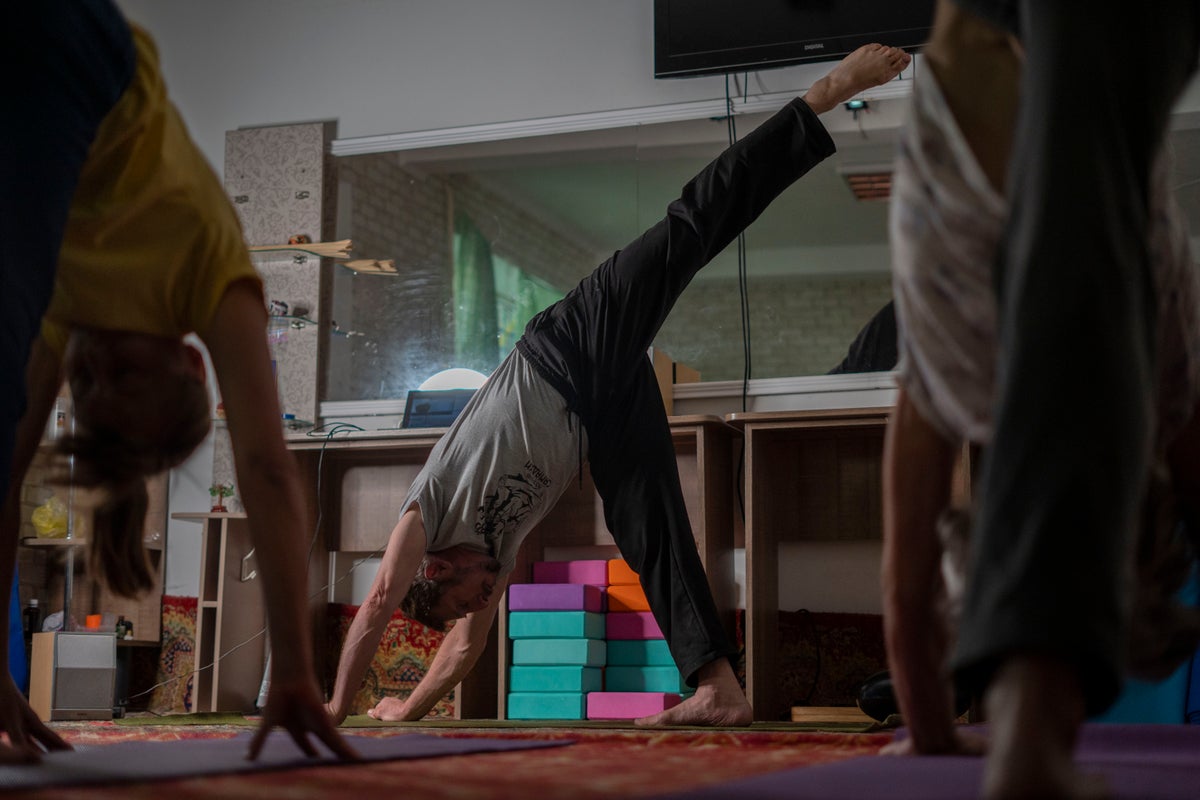
In a basement in one of the front-line cities in Ukraine's Donetsk region, people gather three times a week in the morning for yoga to alleviate the stress caused by the constant shelling from Russian artillery.
Soothing music fills the basement in Kramatorsk, where the humid air is tangible.
“We let go of the external world,” Serhii Zaloznyi, a 52-year-old yoga instructor, said in a serene tone. He gently leads people into a meditative state.
Occasionally, the sound of water rushing through the pipes of the multistory building disrupts the tranquil music, serving as a reminder that the yoga session unfolds in the basement.
“Peace, tranquility and balance feel within the heart,” Zaloznyi continues as people calmly breathe with their eyes closed.
For the participants, the “external world” is life in a front-line city where sirens sound every few hours, and the noise of explosions disrupts their daily lives.
Kramatorsk is just 30 kilometers (around 20 miles) from the battle front in the Donetsk region, where some of the heaviest fighting in eastern Ukraine takes place.
In late July, a Russian missile hit one of Kramatorsk’s most well-known restaurants, wiping out 13 lives, and shocked the city's residents.
But in this modest basement in a residential district, people come to find a feeling of safety and security by attending the yoga sessions, which happen according to schedule despite everything.
“In the beginning, the war overwhelmed people, and right here is where they found peace in their hearts and souls, tranquility, and simply solid ground beneath their feet,” Zaloznyi said.
One of those attending is Viktoria Omelchenko, 47, who initially left Kramatorsk but returned a few months later.
“Yoga brought me to emotional balance. Yoga classes gradually calmed me down, balanced me, taught me not to be afraid, to feel in harmony and balance,” she said.
“That’s why these classes are really very important, especially in our city. When it’s restless, they help a lot.”
When the war started, Zaloznyi taught online because most of the people who used to attend yoga had fled to safer regions. Later, people began to return, and he resumed in-person sessions last spring.
The gym they used before the war was converted into a shelter where families with children take cover. Now, instead of yoga mats, there are supplies of water for emergencies.
Zaloznyi quickly found a new space, which used to be a beauty salon. The owners left Kramatorsk and allowed the yoga sessions to be held there.
On the walls of the yoga studio, the photos from past hairdressing workshops can be seen. And in the improvised changing room, large bottles of professional care shampoo rest on the shelves, now covered in dust.
Nonetheless, the yoga participants aren't troubled by this. They persist in following Zaloznyi’s guidance, moving their bodies from one asana, or yoga position, to another with closed eyes. The room is dimly lit, because the windows are covered with colored tape, intended to prevent glass from shattering in case of an attack.
“There are moments when shelling occurs, of course, and people are anxious. The sense of added protection brings extra tranquility. Because the basement space is safer,” Zaloznyi said.
His classes cost 90 Ukrainian hryvnias ($3), and five to six people attend them regularly.
Another participant, Valentyna Vandysheva, 61, joined the classes three months ago “for health and calming her nerves.”
“Physical activity balances emotions, so it helped. You don’t react as strongly to sirens and explosions,” she said.
Zaloznyi is confident that whenever they come together to practice calming yoga, everything will be fine. The participants support each other emotionally, and as a result, a feeling of community has already emerged.
“I would say that our room is alive already. It protects us. This space, it’s completely familiar and safe for us,” Zaloznyi said.







